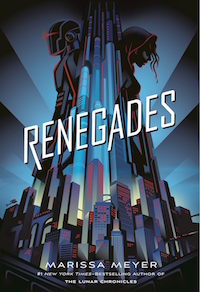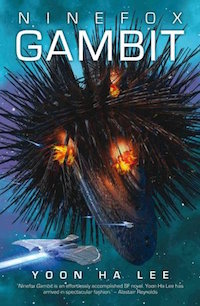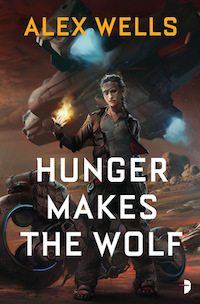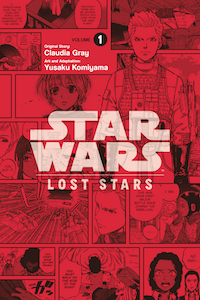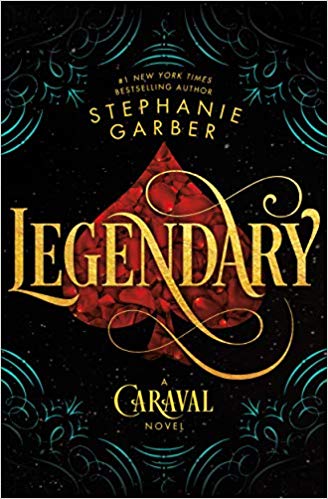Hey YA Readers! Today we’ve got a really fun guest newsletter.
“What’s Up in YA?” is sponsored by Epic Reads.
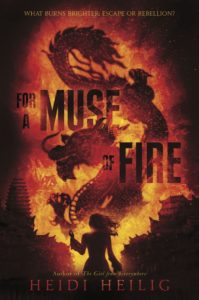 A young woman with a dangerous power she barely understands. A smuggler with secrets of his own. A country torn between a merciless colonial army, a terrifying tyrant, and a feared rebel leader. The first book in a new trilogy from the acclaimed Heidi Heilig blends traditional storytelling with ephemera for a lush, page-turning tale of escape and rebellion.
A young woman with a dangerous power she barely understands. A smuggler with secrets of his own. A country torn between a merciless colonial army, a terrifying tyrant, and a feared rebel leader. The first book in a new trilogy from the acclaimed Heidi Heilig blends traditional storytelling with ephemera for a lush, page-turning tale of escape and rebellion.
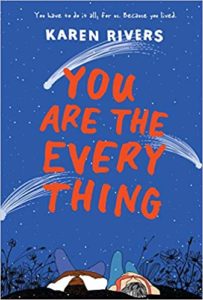 Karen Rivers is prolific in the world of kid/middle grade/YA lit, but if you haven’t read her books, you’re in for a treat. Her next YA book You Are The Everything comes out tomorrow, October 30, and it would be the perfect place to begin your journey into her work.
Karen Rivers is prolific in the world of kid/middle grade/YA lit, but if you haven’t read her books, you’re in for a treat. Her next YA book You Are The Everything comes out tomorrow, October 30, and it would be the perfect place to begin your journey into her work.
You Are The Everything has earned a number of accolades and they’re well-deserved. The book follows Elyse and her long-time crush Josh, who are the sole survivors of a plane crash that kills the rest of their classmates on a flight back home from a trip to France. After a long period of recovery back home in California, Elyse and Josh aren’t merely the two who survived; they’re now a loving, passionate, and popular couple who are living their dream lives in Wyoming.
It all sounds great. It all sounds luminous.
But it’s possible none of this is true at all.
 Rivers’s book is told in second person, and it’s a story about grief, about trauma, and about missed opportunities. It’s about destiny and how we can — and cannot — take control of our own lives. Saying any more would ruin this brilliant and unique read.
Rivers’s book is told in second person, and it’s a story about grief, about trauma, and about missed opportunities. It’s about destiny and how we can — and cannot — take control of our own lives. Saying any more would ruin this brilliant and unique read.
I asked Karen to talk a bit about her book, as well as talk about the choice to write You Are The Everything in second person and other books YA readers might love that are told in a similar style.
____________________
You
I first remember seeing the use of second person in everyday speech a few years ago, when I was watching reality TV, one of my guilty pleasures. When contestants were being interviewed one on one, I noticed, after some emotional scene had occurred, they answered with “you” instead of “I”.
For example, when asked how he felt about being rejected by The Bachelorette, a contestant might say, “Well, you know, you’re broken-hearted, you’ve put so much into the relationship and then you’re done and you just don’t get it. You’re blind-sided.”
When this happened, I would scream at the TV: “You mean, I’m broken-hearted! Not ME! You!”
I had to understand, so I began Googling. I read about the psychology of the second person. I read that it was a way of distancing yourself from your emotions. I read that frequently survivors used this language. I read that trauma sometimes triggered it, that soldiers interviewed after battles would default to it. I learned that “you” is the language of pain.
I filed this information away in my mental cabinet where I keep things I’ve found interesting but I’m not sure what use they’ll have.
I continued to yell at the TV.
*
I’ve been a blogger for many years, long after the Internet declared that blogs were dead. Blogging is a way of stretching my creative muscles before a novel-writing sprint. It’s my way of unwinding, unraveling things in my own life, helping me see what I need to understand about myself. I used my blog a lot when my marriage-like-relationship transformed into a divorce-like-situation.
When I blogged about things that had been devastating to me, I noticed that I defaulted to the second person.
“Interesting,” I thought.
I thought about pain. I thought about distance.
I don’t remember this being a conscious decision. (I do notice that I’ve used it less lately. I hope that means that I’m happy now.)
“Start with the yellow dress that you bought two years ago,” I wrote. “It hangs on the handle of your dressing table such that every time you open a drawer, the dress billows and soars like a bright yellow flag, reminding you of the life you bought the dress to suit, a life that you didn’t have then and don’t have now.”
It turns out that they’re right: when you’re feeling pain, it’s easier to be you, not me.
*
When I sat down to write YOU ARE THE EVERYTHING, I knew the plane was going to crash and everything that happened after that would be so very very emotional and so very very hard.
I imagined the reporters and the microphones and the questions. “You survived,” they might say. “How does that feel?”
How would I answer, if it were me?
“Well,” I might say. “It feels surreal. You ask yourself, why did I survive when so many others died? You wonder why you were spared.”
I began to write.
I wrote the words: “You are on a plane.”
There was never a choice with this book. It had to be second person. There was no other way.
*
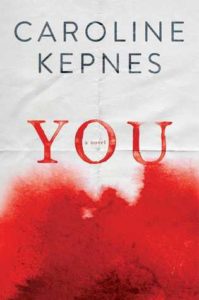 My favourite second person novel is You by Caroline Kepnes. In the novel, the narrator, Joe Goldberg, a writer/stalker/bookstore clerk becomes obsessed with a customer, Guinivere. As the novel slowly, horrifically unfolds, Joe addresses Guinivere the whole time. In this way, the “you” in the book is not true second person, but the book is a masterpiece of slowly intensifying suspense, the kind of book you stay up all night to finish. At least, I did. While it’s not YA, but almost surely has broad YA appeal. The absolutely mesmerizing narrative voice made me foist this one on friends, on family, on strangers in waiting rooms.
My favourite second person novel is You by Caroline Kepnes. In the novel, the narrator, Joe Goldberg, a writer/stalker/bookstore clerk becomes obsessed with a customer, Guinivere. As the novel slowly, horrifically unfolds, Joe addresses Guinivere the whole time. In this way, the “you” in the book is not true second person, but the book is a masterpiece of slowly intensifying suspense, the kind of book you stay up all night to finish. At least, I did. While it’s not YA, but almost surely has broad YA appeal. The absolutely mesmerizing narrative voice made me foist this one on friends, on family, on strangers in waiting rooms.
Similarly, Lucy Christopher’s Stolen, a 2011 Printz honor book , is an Australian YA novel that lyrically and gorgeously weaves a picture for the reader using the second person. The entire novel is told through a letter from Gemma to her kidnapper, a man named Ty. Again, the novel had a captivating, read-it-straight-through quality. There is a poetic beauty in the language that made it stand out in my memory for years.
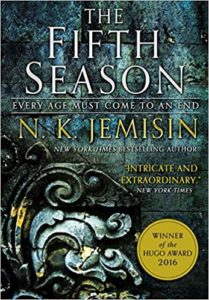 In the 2016 Hugo Award-winning fantasy The Fifth Season, N.K. Jemison dips in and out of multiple points of view. For me, the second person passages lifted off the page. They were so compellingly beautiful that I read and re-read them, savoring the language. The NYT calls this book, “Intricate and extraordinary” and it is not just these things because of the immersive fantasy elements, but because of Jemison’s use of language, the way her fluctuating points-of-view add delicate layers to an already immersive experience. By alternating the voice in this way, she is able to magnify the emotional connection that the reader has to the story. She, in fact, invites you in: “You are she. She is you. You are Essun. Remember?”
In the 2016 Hugo Award-winning fantasy The Fifth Season, N.K. Jemison dips in and out of multiple points of view. For me, the second person passages lifted off the page. They were so compellingly beautiful that I read and re-read them, savoring the language. The NYT calls this book, “Intricate and extraordinary” and it is not just these things because of the immersive fantasy elements, but because of Jemison’s use of language, the way her fluctuating points-of-view add delicate layers to an already immersive experience. By alternating the voice in this way, she is able to magnify the emotional connection that the reader has to the story. She, in fact, invites you in: “You are she. She is you. You are Essun. Remember?”
Rebecca Stead has long been one of my favourite middle grade authors, and in 2015, she released GOODBYE, STRANGER, which I would put right on the magical border between YA and MG (with broad appeal to both audiences), she similarly layers multiple points of view, including second person, as her narrative voice shifts from character to character. This book feels like a series of glass blocks stacked together, evenly, precisely, perfectly. It’s also noteworthy that until the end of the novel, the reader isn’t told who the “you” voice is, which keeps the reader turning pages until the end, when the blocks all come together perfectly to tie the book up in the most satisfying way.
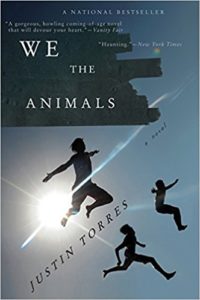 Justin Torres’ We The Animals (2011) – the movie version just won the 2018 Sundance Next Innovator Award — is not second person at all, nor is it – like YOU – marketed as YA, but it’s another book worth mentioning here, as Torres’ book has wide YA appeal. In this novella, Torres uses the third-person plural – the only time I can remember reading a book in this voice – and turns his short, surprising novel into poetry. The “we” is the three brothers, but who speak through one voice. I remember when I read this book years ago, reading the first page and thinking, “What is this?” And as I kept reading, I was delighted. This book, in my memory, feels like a fragment of something astonishing. I’m still so impressed that he made it work, this unusual voice, that it was the voice that made the story soar.
Justin Torres’ We The Animals (2011) – the movie version just won the 2018 Sundance Next Innovator Award — is not second person at all, nor is it – like YOU – marketed as YA, but it’s another book worth mentioning here, as Torres’ book has wide YA appeal. In this novella, Torres uses the third-person plural – the only time I can remember reading a book in this voice – and turns his short, surprising novel into poetry. The “we” is the three brothers, but who speak through one voice. I remember when I read this book years ago, reading the first page and thinking, “What is this?” And as I kept reading, I was delighted. This book, in my memory, feels like a fragment of something astonishing. I’m still so impressed that he made it work, this unusual voice, that it was the voice that made the story soar.
**
KAREN RIVERS is the author of twenty-one novels for children, teens, and adults, including the highly praised The Girl in the Well Is Me, All That Was, Before We Go Extinct and A Possibility of Whales. She lives in British Columbia, Canada. Find her online at karenrivers.com or on Twitter @karenrivers.
____________________
Thanks, Karen, and thanks readers for hanging out! We’ll see you again in November (~spooky~)
— Kelly Jensen, @veronikellymars on Twitter and Instagram
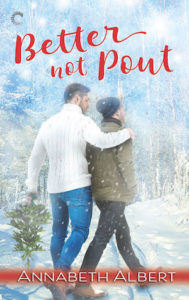
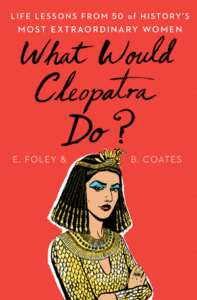
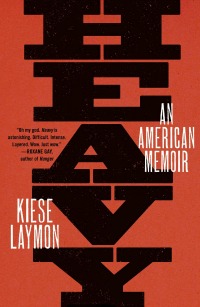 Heavy: An American Memoir
Heavy: An American Memoir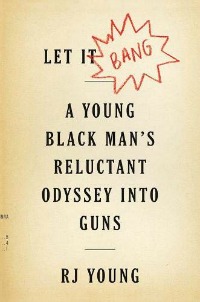 Let It Bang
Let It Bang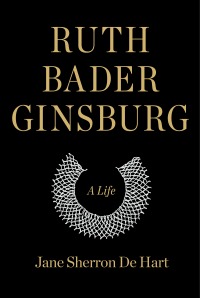 Ruth Bader Ginsburg
Ruth Bader Ginsburg
 Name Of The Dog
Name Of The Dog The first 3 books in
The first 3 books in 